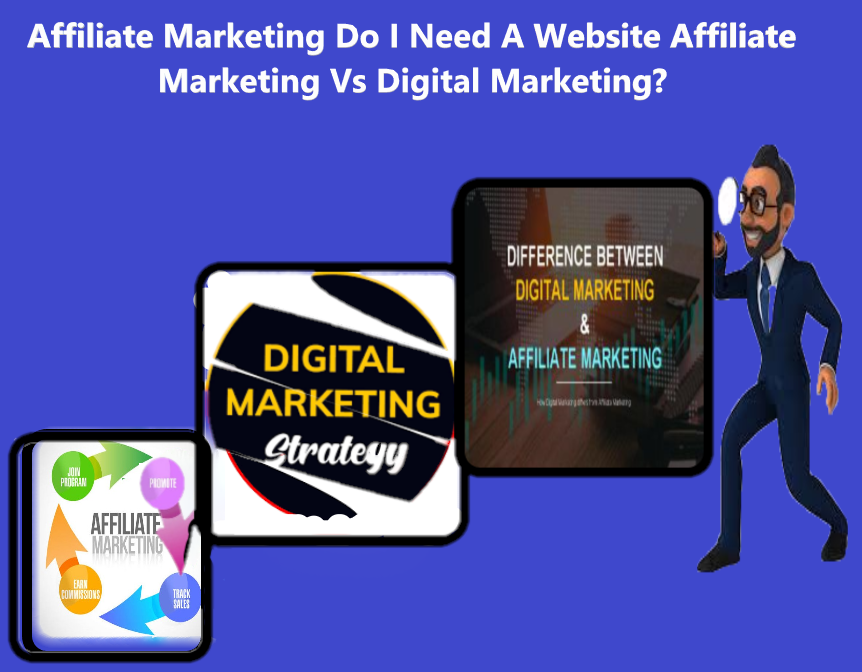Affiliate marketing and digital marketing are related but different concepts.
Affiliate Marketing Vs Digital Marketing:
Affiliate Marketing vs Digital Marketing the ever-evolving landscape of online commerce two prominent strategies stand out. Affiliate Marketing Do I Need A Website Affiliate Marketing Vs Digital Marketing. These methodologies, while distinct, share common goals of reaching and engaging audiences to drive sales and revenue. However, the approaches they employ and the necessity of a website in each strategy differ significantly. This article aims to delve into the dynamics of both Affiliate Marketing and Digital Marketing, exploring whether having a website is essential in these realms and uncovering the nuances that set them apart.

Understand Affiliate Marketing:
Affiliate Marketing revolves around partnerships between a business (the merchant) and individuals or entities (affiliates) who promote the merchant’s products or services. Affiliates earn commissions for every sale, click, or lead generated through their marketing efforts. Traditional Affiliate Marketing often relies on affiliate links, unique URLs that track referrals from the affiliate’s platform to the merchant’s site.
Affiliate Marketing Do I Need a Website?
The short answer is no, you don’t necessarily need a website to engage in Affiliate Marketing. Many successful affiliates leverage various platforms beyond websites, such as social media, email newsletters, podcasts, YouTube channels, and more. These channels serve as effective mediums to reach and engage audiences without the need for a standalone website.
Affiliate Marketing Do I need a Website Affiliate Marketing vs Digital Marketing?

Advantage of Using a Website in Affiliate Marketing:
However, having a website provides a multitude of advantages for affiliate marketers. A website acts as a central hub to curate content, display affiliate links, and build an audience. It allows for greater control over branding, content creation, and audience engagement. Additionally, a website provides a platform for SEO optimization, potentially attracting organic traffic and expanding the affiliate marketer’s reach.
The Role of Digital Marketing:
On the other hand, Digital Marketing encompasses a broader spectrum of online promotional strategies aimed at promoting products, services, or brands through various digital channels. These channels may include search engines, social media, email, content marketing, pay-per-click advertising, and more.
Digital Marketing Do I Need a Website?
Unlike Affiliate Marketing, Digital Marketing strategies often heavily rely on having a dedicated website. A website serves as the cornerstone for many digital campaigns. It provides a centralized location to drive traffic, capture leads, and convert visitors into customers. In essence, for most Digital Marketing endeavors, a website acts as a fundamental asset in establishing an online presence and facilitating conversions.

Contrasting Affiliate Marketing with Digital Marketing:
While both Affiliate Marketing and Digital Marketing aim to drive sales and revenue, they diverge in their core approaches. Affiliate Marketing primarily focuses on partnerships and leveraging established platforms to promote products or services, while Digital Marketing encompasses a broader spectrum of strategies aimed at brand promotion, audience engagement, and direct sales through owned channels like websites and social media.
Conclusion:
In conclusion, the need for a website varies between Affiliate Marketing and Digital Marketing. While not mandatory for Affiliate Marketing, having a website offers significant advantages in terms of control, branding, and audience engagement. Conversely, in Digital Marketing, a website often serves as a critical asset, providing a centralized platform for various promotional efforts.
Ultimately, the choice between Affiliate Marketing and Digital Marketing, as well as the necessity of a website, depends on individual goals, resources, and the preferred approach to reaching and engaging target audiences in the vast digital landscape. Both strategies present unique opportunities for businesses and marketers, and understanding their nuances is key to leveraging their potential effectively. so, Affiliate Marketing I Need a Website, Affiliate Marketing vs Digital Marketing.

